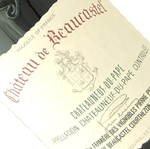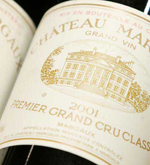Vintage 2011 Bordeaux 30 Jan 2012
Bordeaux 2011: Calls for price drop after 'arrogant' 2010s
- Monday 30 January 2012
- by Adam Lechmere
- Comments
Bordeaux was 'arrogant' in its pricing last year, the managing director of Chateau Lafite has told Decanter.com as merchants call on Bordeaux to come down in price on the 2011s.
Lafite: heading for a reduction in price?
After two acclaimed vintages, it is generally accepted 2011 is going to be fine but not stellar – and merchants in Europe and the US, who for the last two years have accepted high prices, are once again calling for restraint.
After two acclaimed vintages, it is generally accepted 2011 is going to be fine but not stellar – and merchants in Europe and the US, who for the last two years have accepted high prices, are once again calling for restraint.
In London there is a feeling that the bubble has been pricked, if not burst, by end of year figures, reported on Decanter.com, that showed prices of top Bordeaux plummeting.
‘We have to recapture the confidence that’s been seeping away, and readdress the drinkers,’ Berry Brothers’ wine director Alun Griffiths said.
He went on, ‘2011 reminds me of 2008, which wasn’t hailed as a great vintage. The chateaux have to realise where their market is: are they selling the wine as an investment vehicle, or for drinkers?’
It would seem that in Bordeaux they are fully aware of the situation – and are making efforts to conciliate their market two months before En Primeur starts at the end of March.
In reference to the high prices of the 2010 vintage and the slowness of chateaux to declare their prices, Christophe Salin, managing director of Domaines Barons de Rothschild (Lafite) told Decanter.com, 'Last year came across as arrogance, in terms of both timing and prices, for many chateaux.'
There is a need to price ‘intelligently’, Jean Pierre Rousseau of Diva, one of the biggest Bordeaux negociants said, or en primeur might be a non-event.
'If the prices are intelligent this year, there will be an en primeur campaign if not, things will be complicated. Not all chateaux perhaps realise the effect their high prices had last year.’
With memories of the 2008 vintage, could the first growths repeat their coup de theâtre of April 2009 when – led by Chateau Mouton Rothschild – they came out at €100?
‘As to that happening, we can dream on,’ Stephen Browett at Farr Vintners in London said. ‘But they must come out at or below current 2008 prices in order to have any viability.’
‘There is going to have to be a severe correction,’ Chris Adams, CEO of Sherry-Lehmann in New York said. ‘If the wines are more than US$350 a bottle on release, we will pass.’
Adams made the point that even if the economic climate were conducive to splashing out on wine futures, there is unlikely to be much appetite to buy futures in what will probably be a decent but unspectacular vintage, especially when 2008 ‘isn’t exactly flying off the shelves’.
In California, Shaun Bishop of JJ Buckley in Oakland said he would be able to manage the first growths at US$400 a bottle, but no more. ‘It’s going to be a difficult vintage to sell.’
Most UK merchants privately suggest they would find a €500 per bottle retail price realistic for the first growths. This would mean a release price of €400 – a reduction of more than 20% on last year.
One major factor in persuading chateaux to come down in price is China. As Ian Ford of Chinese importer Summergate argues in Decanter magazine this month, the collapse in value of wines like Lafite 2008, and second wines Carruades de Lafite and Margaux’s Pavillon Rouge, may indicate not that China is losing interest in fine wine, but that its consumers are no longer easily swayed by trophy labels and are looking beyond Bordeaux.
‘Demand is diversifying… and the stars of Rhone, Burgundy, Chile, Australia, Napa, and others, are all on the rise.'
Salin’s words, and those of many other chateau proprietors and senior negociants that Decanter.com has spoken to, indicate that Bordeaux is fully aware of the need to respect a worldwide market that is the opposite of buoyant, and bring prices down.










